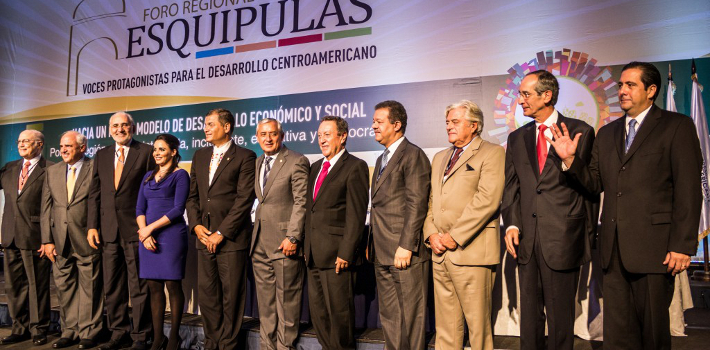
EspañolA few days ago, Rafael Correa, president of Ecuador, participated in the Esquipulas Forum in Guatemala. The event was also attended by former Latin-American presidents, a few of them well-known for their erratic policies and issues with corruption.
Correa, with his usual bombastic style, proposed the implementation of a “new economic model” that would serve “the great majority,” and also protect the environment and natural resources. The attendees applauded him, of course, and the press highlighted his proposal in bold headlines. Only a select few editorials criticized his declarations, which were generally accepted as valuable contributions for the region’s future.
For a long time now, we have heard similar proposals throughout the world: a “third way,” “economies that serve people, not markets,” and other similar nonsense that is usually marked by criticism of “neoliberalism,” which seems more like a ghost than an actual political entity.
There is not a single economic theory with even an ounce of consistency behind these slogans, but they allow politicians to at least appear as if they are addressing the needs of the people. They do not call themselves “socialists,” likely because of the word’s terrible connotations, but they reject capitalism as a model that only benefits the rich, unscrupulous bankers, and large corporations.
There is not a single economic theory with even an ounce of consistency behind these slogans.
The question is: how will this new economic model be translated into practice? What does it mean in real and concrete terms?
In Correa’s case, it has more to do with a demagogic attitude that has revealed itself on two principal fronts. Politically, Ecuador’s president is a type of dictator, a man who has modified the constitution to stay in power indefinitely and, through the use of gifts and populist speeches, has ensured the support of a significant portion of the electorate.
Economically, Correa has maintained a degree of fiscal order, which has allowed the US dollar to remain the country’s currency, while increasing the power of the state in order to further control the economy.
While he has not adopted explicitly socialist policies, such as those seen in Venezuela, he has not shown respect for the principles of what we could call capitalism: private property, rule of law, and freedom to develop all kinds of economic activity. This is certainly not an original mix of policies, and in no way can it be considered a new model of development. It is, rather, simply a variant of policies that have been in place for the last 50 years.
Nicaragua and Bolivia have also taken a similar path to Correa’s Ecuador.
Aspiring dictators Daniel Ortega and Evo Morales have each been able to combine rampant demagoguery and populist policies with an economic agenda that maintains a certain balance and does not lead directly to socialism.
Morales and Ortega have done well to not bankrupt their countries — at least not yet — unlike Argentina and Venezuela. These two countries have thoroughly implemented the sort of economic interventionism that has caused our region so much damage in the past century and led to widespread crisis: strict control of foreign currencies, prices arbitrarily fixed by the authorities, harassment of private enterprise, and a permanent confrontation with the opposition.
The results of this old model are obvious: constant devaluations, inflation, and production freezes. In the case of Venezuela, which does define itself as a socialist country, we can add acute shortages and political violence.
To call these old interventionist policies a “new model” is … an example of intellectual arrogance.
To call these old interventionist policies a “new model” is, at the very least, an example of intellectual arrogance. There is nothing new about trying to regulate and control markets, threatening expropriation, and subjecting consumers to policies that create a false and temporary prosperity, resulting in the sort of severe crises that occur in places like Venezuelan and Argentina today.
The fact that these countries have not been able to fully implement the old socialist recipe of economic centralization and complete political control does not mean we have been presented with a new, stable, and productive economic system.
It only means we are dealing with a hybrid, hodgepodge of policies that cause inefficiency: no country on Earth has overcome stagnation and poverty through this confusing “third way.” This approach has only brought inflation, increased scarcity, and a general move backwards wherever it has been applied.
This “new model” that is being proposed by some Latin-American governments today is merely a repetition of the failed policies most of Latin America has abandoned; the facts confirm it.
 Versión Español
Versión Español












